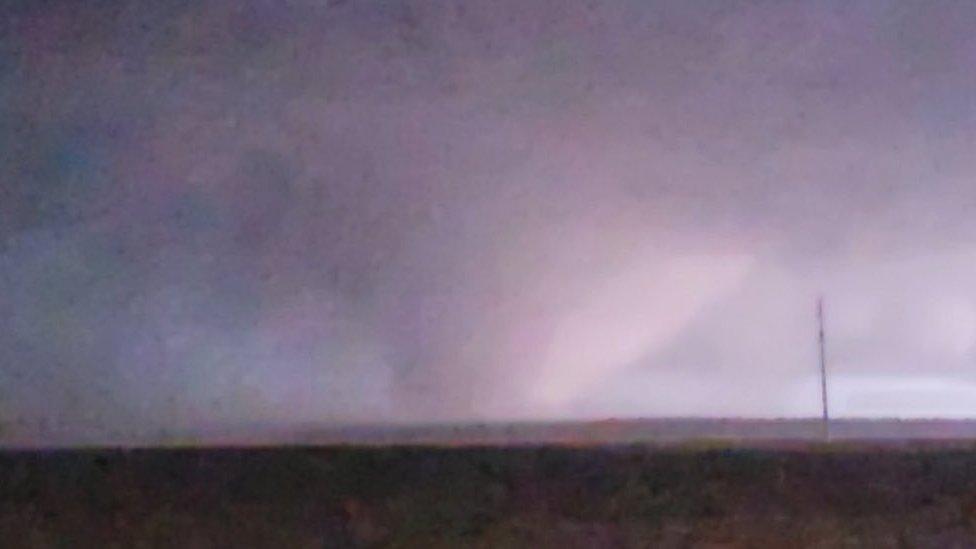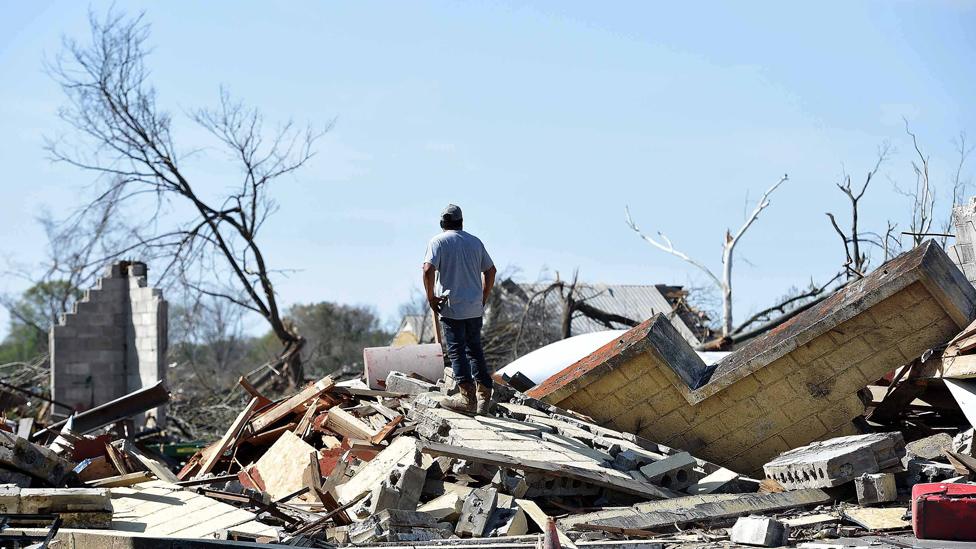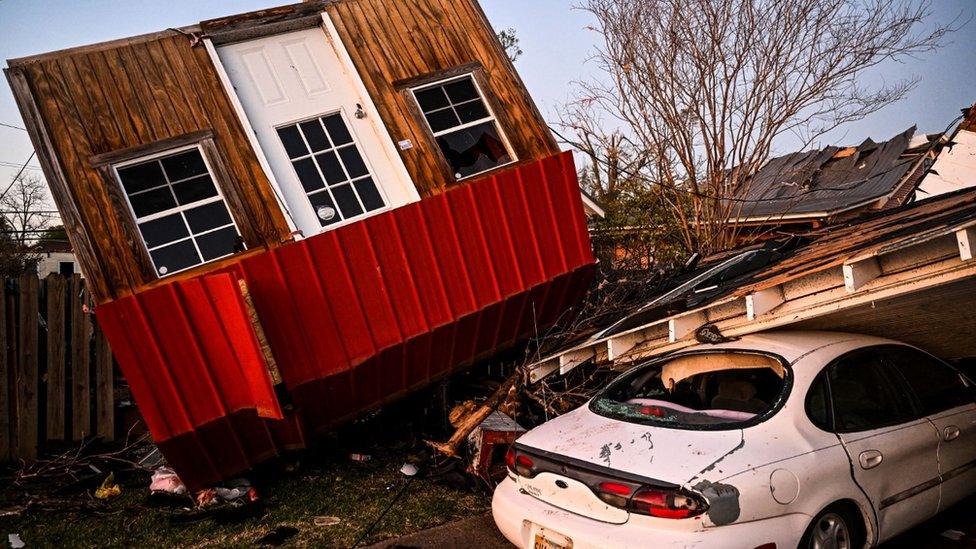More storms feared after Mississippi tornado
- Published
Watch: Sophie Long visits the destroyed homes of Mississippi tornado victims
More severe weather could be on its way to the US state of Mississippi following the tornadoes which killed 26 people, the governor has warned.
Governor Tate Reeves said significant risks remained in parts of the state.
Hundreds of people have been displaced in the wake of the tornadoes which tore through Mississippi and Alabama on Friday night.
The mayor of one of the worst affected towns said he had lost personal friends in the disaster.
Friday's tornado was the deadliest in the state of Mississippi in more than a decade. At least 25 people have died in the state, with one person confirmed dead in neighbouring Alabama.
Trees have been uprooted, trucks have overturned into houses and power lines have been brought down by the tornado - classified as "violent" and given the second-highest rating possible.
More than 36,000 people remained without power as of Monday morning in what is one of the poorest regions in the country.
On Saturday, survivors of the disaster could be seen walking around, dazed and in shock. Sunday, on the other hand, has been a hive of activity.
Volunteers, some coming from neighbouring Arkansas, Louisiana and Tennessee, have been helping with the clean-up operation.
President Joe Biden has declared a state of emergency and deployed federal resources to help with the rescue and response in some of the worst-hit towns.
The devastation is so great, it must be difficult to know where to begin. Crews are working to remove broken trees that are pinning down power lines, with thousands of people losing power during Friday's storm.
Stations have been set up outside some of the few buildings still partially standing where people can collect water and sandwiches.
But while local communities are grappling with the response, there are warnings of further severe storms to come.
Watch: Governor Tate Reeves told reporters he was "damn proud to be a Mississippian"
Speaking at a news conference convened in the western town of Rolling Fork, Governor Reeves said: "What we've seen, much like the storm that occurred Friday night, is in the 24-36 hours that are leading up to this afternoon, it appears that the risks seem to be getting worse and worse, not better.
"And when you stand here and see this, what feels like a beautiful weather day in Mississippi, please be aware and please know: if you are south of I-55 in Mississippi today there are significant risks. We are prepared."
The governor said it had been "heart-breaking" to see the loss and devastation caused by the twister, but said he was "damn proud to be a Mississippian" after seeing how locals had responded.
"Because Mississippians have done what Mississippians do," he said. "In times of tragedy, in times of crisis, they stand up and they show up, and they're here to help themselves, help their neighbours."
In the town of Rolling Fork, where about one-fifth of the population lives below the poverty line, the extent of the devastation is still difficult to comprehend.
As you approach the town from the south, you can clearly see the tornado's path. A straight line of trees have been stripped of their branches and uprooted, while others to either side are untouched.

Debris is strewn across the acres of farmland that surround the town, where parts of buildings and vehicles were deposited.
Mayor Eldridge Walker, also speaking at Sunday's news conference, said the town would come back "bigger and better than ever before" to rounds of applause from those who gathered.
"I'm not only just the mayor of this community, but I've lost personal friends," he said.
"I'm also the local funeral director - now I'm having to meet those who have lost loved ones and help them make it through."
US Homeland Security Secretary Alejandro Mayorkas visited Rolling Fork, where he pledged to help rebuild stronger buildings.
Mr Mayorkas said the stronger buildings would prevent the same tragedy happening again as severe weather events increase in frequency and gravity.
He earlier pledged to help the people of Mississippi, "not just today but for the long haul".
"It is inspiring to see the people of Mississippi come together... and the people of this country come together to assist those in dire need," he said.
Soon after he spoke a lightning storm put a pause on the recovery operation.
More than 20 million Americans are under threat of severe storms on Monday.
The impact of climate change on the frequency of storms is still unclear, but we know that increased sea surface temperatures warm the air above and make more energy available to drive hurricanes, cyclones and typhoons.
As a result, they are likely to be more intense with more extreme rainfall.

Are you or your family in the affected areas? If you are safe to do so, please share your experiences by emailing haveyoursay@bbc.co.uk, external.
Please include a contact number if you are willing to speak to a BBC journalist. You can also get in touch in the following ways:
WhatsApp: +44 7756 165803, external
Tweet: @BBC_HaveYourSay, external
Or fill out the form below
Please read our terms & conditions and privacy policy
If you are reading this page and can't see the form you will need to visit the mobile version of the BBC website to submit your question or comment or you can email us at HaveYourSay@bbc.co.uk, external. Please include your name, age and location with any submission.

Related topics
- Published26 March 2023

- Published27 March 2023

- Published26 March 2023
